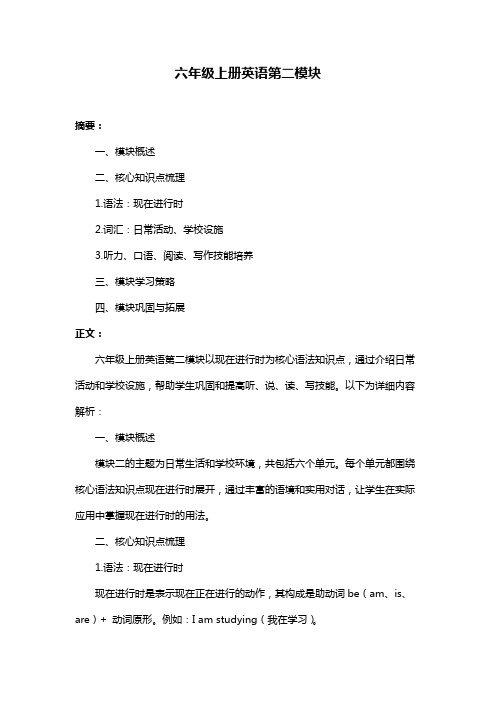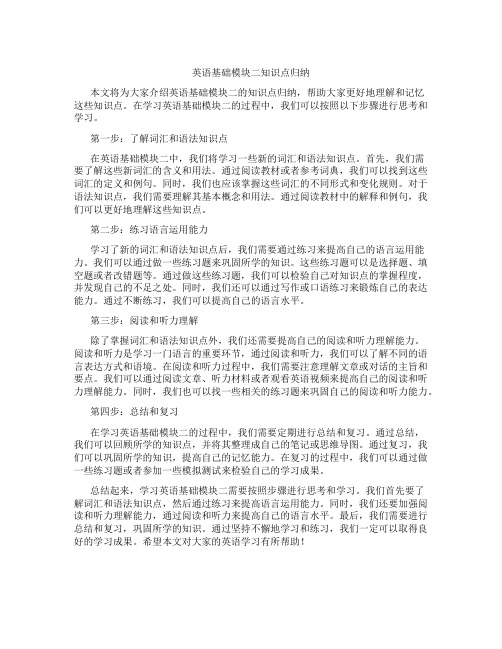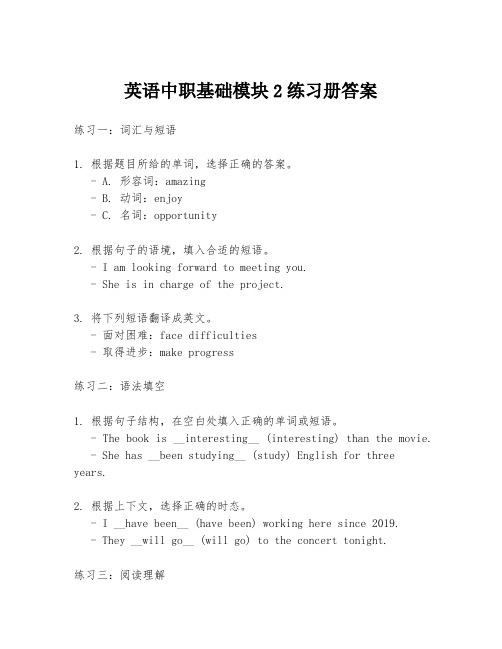模块二
六年级上册英语第二模块

六年级上册英语第二模块摘要:一、模块概述二、核心知识点梳理1.语法:现在进行时2.词汇:日常活动、学校设施3.听力、口语、阅读、写作技能培养三、模块学习策略四、模块巩固与拓展正文:六年级上册英语第二模块以现在进行时为核心语法知识点,通过介绍日常活动和学校设施,帮助学生巩固和提高听、说、读、写技能。
以下为详细内容解析:一、模块概述模块二的主题为日常生活和学校环境,共包括六个单元。
每个单元都围绕核心语法知识点现在进行时展开,通过丰富的语境和实用对话,让学生在实际应用中掌握现在进行时的用法。
二、核心知识点梳理1.语法:现在进行时现在进行时是表示现在正在进行的动作,其构成是助动词be(am、is、are)+ 动词原形。
例如:I am studying(我在学习)。
2.词汇:日常活动、学校设施本模块涉及的日常活动和学校设施词汇有:playground(操场)、library (图书馆)、classroom(教室)、computer room(电脑房)、music room (音乐教室)等。
3.听力、口语、阅读、写作技能培养通过本模块的学习,学生将在听力、口语、阅读和写作方面得到全面提升。
例如,在学习过程中,学生需要听取指令并在实际场景中进行对话,以锻炼听力理解能力;在口语练习中,学生将运用现在进行时描述正在进行的动作,提高口语表达能力。
三、模块学习策略1.结合实际场景进行学习,加深对现在进行时的理解。
2.开展小组活动,让学生在实际对话中运用现在进行时。
3.制作学习卡片,巩固日常活动和学校设施词汇。
四、模块巩固与拓展1.完成课本练习,确保对现在进行时的掌握。
2.开展家庭作业,要求学生用现在进行时描述日常生活。
3.鼓励学生参加英语角活动,与他人用英语进行交流。
总之,六年级上册英语第二模块通过丰富的语境和实用对话,旨在帮助学生掌握现在进行时,并在实际生活中运用所学知识。
英语基础模块二知识点归纳

英语基础模块二知识点归纳本文将为大家介绍英语基础模块二的知识点归纳,帮助大家更好地理解和记忆这些知识点。
在学习英语基础模块二的过程中,我们可以按照以下步骤进行思考和学习。
第一步:了解词汇和语法知识点在英语基础模块二中,我们将学习一些新的词汇和语法知识点。
首先,我们需要了解这些新词汇的含义和用法。
通过阅读教材或者参考词典,我们可以找到这些词汇的定义和例句。
同时,我们也应该掌握这些词汇的不同形式和变化规则。
对于语法知识点,我们需要理解其基本概念和用法。
通过阅读教材中的解释和例句,我们可以更好地理解这些知识点。
第二步:练习语言运用能力学习了新的词汇和语法知识点后,我们需要通过练习来提高自己的语言运用能力。
我们可以通过做一些练习题来巩固所学的知识。
这些练习题可以是选择题、填空题或者改错题等。
通过做这些练习题,我们可以检验自己对知识点的掌握程度,并发现自己的不足之处。
同时,我们还可以通过写作或口语练习来锻炼自己的表达能力。
通过不断练习,我们可以提高自己的语言水平。
第三步:阅读和听力理解除了掌握词汇和语法知识点外,我们还需要提高自己的阅读和听力理解能力。
阅读和听力是学习一门语言的重要环节,通过阅读和听力,我们可以了解不同的语言表达方式和语境。
在阅读和听力过程中,我们需要注意理解文章或对话的主旨和要点。
我们可以通过阅读文章、听力材料或者观看英语视频来提高自己的阅读和听力理解能力。
同时,我们也可以找一些相关的练习题来巩固自己的阅读和听力能力。
第四步:总结和复习在学习英语基础模块二的过程中,我们需要定期进行总结和复习。
通过总结,我们可以回顾所学的知识点,并将其整理成自己的笔记或思维导图。
通过复习,我们可以巩固所学的知识,提高自己的记忆能力。
在复习的过程中,我们可以通过做一些练习题或者参加一些模拟测试来检验自己的学习成果。
总结起来,学习英语基础模块二需要按照步骤进行思考和学习。
我们首先要了解词汇和语法知识点,然后通过练习来提高语言运用能力。
英语基础模块二知识点总结

英语基础模块二知识点总结Module Two of the English Basics course covers a wide range of topics, including grammar, vocabulary, and comprehension skills. It is designed to provide students with a solid foundation in the English language, and to help them build the necessary skills to communicate effectively in both spoken and written English.1. Parts of SpeechAn understanding of the different parts of speech is essential for developing good grammar skills. The basic parts of speech include nouns, pronouns, verbs, adjectives, adverbs, prepositions, conjunctions, and interjections. Nouns are words that represent people, places, or things, while pronouns are used to replace nouns in sentences. Verbs are action words, while adjectives and adverbs are used to describe or modify nouns and verbs, respectively. Prepositions are used to show the relationship between words in a sentence, while conjunctions are used to connect words, phrases, or clauses. Interjections are used to express emotions or feelings.2. Sentences and PhrasesA sentence is a group of words that expresses a complete thought. It consists of a subject and a predicate, and it must be a complete idea. A phrase, on the other hand, is a group of words that does not have a subject and a predicate, and it does not express a complete thought. Phrases are used to add information to a sentence, but they cannot stand alone as a complete sentence. Understanding the difference between sentences and phrases is important for constructing clear and concise writing.3. Simple and Compound SentencesA simple sentence consists of a single independent clause, which contains a subject and a predicate and expresses a complete thought. A compound sentence, on the other hand, consists of two or more independent clauses that are joined together by a coordinating conjunction, such as "and," "but," or "or." Understanding the difference between simple and compound sentences is important for building strong writing skills and for creating well-structured and coherent paragraphs and essays.4. Conjunctions and TransitionsConjunctions are words that connect words, phrases, or clauses in a sentence, and they are essential for building strong and coherent writing. There are three main types of conjunctions: coordinating conjunctions, which connect words, phrases, or clauses of equal importance; subordinating conjunctions, which connect independent and dependent clauses and show the relationship between them; and correlative conjunctions, which are used in pairs to connect elements in a sentence. Transitions, on the other hand, are words or phrases that show the relationship between ideas and help to create coherence in a piece ofwriting. They are used to signal a shift from one idea to another, to show cause and effect, to contrast ideas, or to show a sequence of events.5. Verb TensesVerbs can change form to show the time of an action or a state of being. The three main verb tenses are past, present, and future, and each tense can be further divided into simple, continuous, and perfect forms. It is important to understand how and when to use different verb tenses in order to communicate effectively and to convey the correct timeline of events.6. Adjectives and AdverbsAdjectives are words that describe or modify nouns, while adverbs are words that describe or modify verbs, adjectives, or other adverbs. Understanding the difference between adjectives and adverbs, and knowing how to use them correctly, is important for building descriptive and engaging writing.7. ArticlesArticles are words that come before nouns and help to indicate whether the noun is specific or general. There are three articles in English: "a," "an," and "the." "A" and "an" are indefinite articles, used to indicate a non-specific noun, while "the" is the definite article, used to indicate a specific noun. Understanding how to use articles correctly is important for building clear and coherent writing.8. Subject-Verb AgreementIt is important for the subject and the verb in a sentence to agree in number and person. This means that a singular subject requires a singular verb, while a plural subject requires a plural verb. Understanding subject-verb agreement is essential for building strong and coherent writing.9. Comprehension SkillsModule Two also focuses on developing comprehension skills, which are essential for understanding written and spoken English. These skills include identifying main ideas, understanding details, making inferences, and evaluating the overall meaning of a text. Developing strong comprehension skills is essential for building strong reading and listening skills.10. Vocabulary BuildingVocabulary building is a key component of Module Two, and it focuses on expanding students' knowledge of English words and phrases. This includes learning new words, understanding word meanings, and using context clues to determine the meaning of unfamiliar words. Developing a strong vocabulary is essential for building strong communication skills and for understanding a wide range of written and spoken English.Overall, Module Two of the English Basics course provides students with a strong foundation in the English language, covering a wide range of grammar, vocabulary, and comprehension skills. By mastering the topics covered in this module, students will build the necessary skills to communicate effectively in both spoken and written English.。
模块二数控车床基本操作

加工程序编辑
操作模式选择开关旋至程序编辑(EDIT)位置,按下CRT/MDI 面板按(PROGRAM)键。输入新的程序号码,再按(INSERT)键 输入,按(EOB)键,再按(INSERT)键,完成新程序号码的建立。 陆 续 利 用 程 序 编 辑 键 ( ALTER ) , ( INSERT ) , ( DELETE ) , (EOB)及消除键(CAN),完成全部程序指令的编辑工作。
例如,建立如图4-16所示的工件坐标系时,只要执行指令T0101,则01号外圆粗车刀 的工件坐标系即可建立完成;执行指令T0303,则03号外圆精车刀的工件坐标系即可建立 完成;执行指令T0505,则05号外圆切槽刀的工件坐标系即可建立完成。其实T指令后两位 数值是各切削刀具所设定的补偿号,其X轴补偿值为刀尖所在位置的直径,Z轴补偿值为刀 尖至工件端面(程序原点)的距离。
数控车床的操作方法及步骤
开机前,应先做好车床外观的例行检查及日常的保养工 作,确定即将操作的机械部件一切状况正常,才能正常开机 工作。
开机及回车床参考点 车床手动控制 加工程序编辑
开机及回车床参考点
打开车床主电源开关。 打开CNC控制器面板电源开关。 等待机器运转3~5min(暖机)后,开始进行回车床参考点的操作。
将操作模式选择开关旋至 手动返回车床参考点(REF)模式。 按轴向选择键(+X),则X轴即作车床参考点回归动作。待X轴的参考点指示 灯亮,即表示X轴已完成回车床参考点操作。 按轴向选择键(+Z),则Z轴即作车床参考点回归动作。待Z轴的参考点指示 灯亮,即表示Z轴也已完成回车床参考点操作。
车床手动控制
数控车床通过面板的手动操作,可完成进给运动、主轴旋转、 刀具转位、冷却液开或关、排屑器启停等动作。
英语中职基础模块2练习册答案

英语中职基础模块2练习册答案练习一:词汇与短语1. 根据题目所给的单词,选择正确的答案。
- A. 形容词:amazing- B. 动词:enjoy- C. 名词:opportunity2. 根据句子的语境,填入合适的短语。
- I am looking forward to meeting you.- She is in charge of the project.3. 将下列短语翻译成英文。
- 面对困难:face difficulties- 取得进步:make progress练习二:语法填空1. 根据句子结构,在空白处填入正确的单词或短语。
- The book is __interesting__ (interesting) than the movie. - She has __been studying__ (study) English for three years.2. 根据上下文,选择正确的时态。
- I __have been__ (have been) working here since 2019.- They __will go__ (will go) to the concert tonight.练习三:阅读理解1. 阅读下列短文,回答问题。
- What is the main idea of the passage?- The main idea is about the benefits of learning a second language.2. 根据短文内容判断正误。
- The author believes that learning a second language can improve memory. (True)练习四:完形填空1. 阅读下面的短文,从选项中选择最合适的词填入空白处。
- When I was a child, I __always__ (often/always) dreamed of becoming a scientist.2. 根据上下文和语法结构,选择正确的选项。
语文版中职英语基础模块2 Unit2重点语言知识汇总

(语文版)中职英语基础模块二重点语言点Unit2 Unit2 Growing Up HealthyGrowing up healthy takes time and effort.健康的成长需要时间和精力。
一、重点单词grow up成长healthy健康的effort努力lifestyle生活方式habit习惯sad难过的stay up熬夜circle圈出correct正确的medicine医学,药medical医学的,医疗的university大学fight against对抗,与……做斗争normal正常的,典型的balance平衡do harm to损害,对……有害plenty大量,充足be made up of由……组成proper正确的,适合的protect保护various各种各样的gym体操馆,健身房stressed焦虑不安的skip不做,不参加toothache牙痛dentist牙科医生pain-killer止痛药brush刷;毛笔,画笔,刷子clinic诊所cough咳嗽temperature温度have a sore throat喉咙痛hole洞,孔tongue绕口令二、重点短语Warm-upeat healthy food 吃健康的食物do exercise 锻炼keep healthy 保持健康keep a good mood 保持好情绪have good habits 有好习惯see doctors 看医生get enough sleep 得到足够的睡眠stay up late 熬夜Listeningbe born in 出生于graduate from 毕业于work as 做……工作do some research 做研究take the lead 带头fight against 与……作斗争Readinglive a healthy lifestyle 过健康的生活stay healthy 保持健康at the same time 同时have a balanced meal 吃得平衡too much 太多do harm to 伤害be made up of 由……组成plenty of 大量have a regular schedule有规律的日程安排get up 起床go to bed 睡觉at a proper time 在恰当的时间keep fit 保持健康turn to sb. for help 向某人求助Speakinghave a toothache/cold/fever牙疼/感冒/发烧in the hospital/school clinic在医院/学校诊所check one’s temperature 检查温度take medicine 吃药twice/three times a day 一天两次/三次brush your teeth 刷牙at least 至少go to the dentist’s 看牙医have a good rest 好好休息have a sore throat 喉咙疼Culture cornerwake up 醒来a cup of hot water 一杯热水start off 以……开始be good for 对……有好处in the West 在西方prefer to 更喜欢bring sb. sth. 给某人带来某物三、重点句子Listening1. He always lives a meaningful life.2.He was born in Nanjing in 1936.3. When he grew up, he decided to study medicine.4. He graduated from Beijing Medical College in 1960.5.In 1971, he worked as a teacher in Guangzhou.6. Exercise is just as important as eating healthy food.1.他总是过着有意义的生活。
语文版中职英语基础模块2 Unit3重点语言知识汇总

(语文版)中职英语基础模块二重点语言点Unit3Unit3 School ClubsDon’t miss opportunities. Time doesn’t come round again.机不可失时不再来。
一、重点单词club俱乐部,社团miss错过,未得到;思念opportunity机会,机遇create创造,创建environmental环境的fund-raising筹款join加入chance机会,时机break休息,间歇allow使有可能,允许run开设,提供;奔跑fellow同伴,同类;同类的fan ……迷,狂热爱好者;风扇universe宇宙,万象weekly每周的planet行星;地球paper cutting剪纸folk art民间艺术image形象;印象;比喻folk tale民间故事,民间传说decoration装饰badminton羽毛球certain某个,某些description描述,说明enable使能够,使可行keep distance away from远离hunting狩猎;寻找dining hall餐厅popularity普及,流行favor喜爱;选择workshop研讨会,讲习班;车间mooncake月饼Chinese knot中国结the mid autumn day中秋节in areas of在……领域二、重点短语Warm-updrama/cooking/science/marketing/enviro nmental/football/fund-raising/swimming /film/reading club 戏剧/烹饪/科学/市场营销/环境/足球/基金筹集/游泳/电影/阅读俱乐部learn more about ourselves了解更多关于我们自己get a break from studies休息一下allow sb. to do 允许某人做have a chance to do 有机会做Listeninggain a lot of benefits 获得了很多好处make friends 交朋友what’s more 另外gain leadership skills 提高领导能力Readingprovide sb. with...用……提供be open to 朝……开放the basic rules 基本规则see sb. do... 看某人做play against 同……比赛cut... into 切成folk tales 民间故事be used for 被用作Speakingjoin in 参加build bird houses 建鸟房子keep a distance away from 保持距离enable sb. to do... 使某人能够做take pictures of 拍照in daily life 在日常生活中slow down 慢下来Culture cornerbe interested in 对……感兴趣take part in 参加all kinds of 各种make mooncakes 做月饼do paper cutting 做剪纸make Chinese knots 做中国结the Mid-autumn Day 中秋节the Dragon-boat Festival 龙舟节encourage sb. to do 鼓励某人做in areas of... 在……领域三、重点句子Listening1.Students can gain a lot of benefits by joining clubs.2.It is a great way to make friends.3.Clubs allow students to try different things. What's more, students can learn more about themselves in clubs.4.By joining clubs, you' ll not only learn more about teamwork, but also have a chance to gain leadership skills.1.学生可以通过加入俱乐部获得很多好处。
模块2 中学课程 附答案(完整)

模块二中学课程一、单项选择题1.认为课程是教学内容的系统组成,并最早提出“课程”概念的教育家是()A杜威B维果斯基C斯宾塞D夸美纽斯2.下列不属于制约学校课程因素的一项是()A教育专家B社会C知识D儿童3.主张课程内容的组织以儿童为中心,提倡“做中学”的课程理论是()A学科课程论B活动课程论C社会课程论D要素课程论4.认为知识是课程的核心,学校课程应以学科分类为基础的课程理论是()A学科课程论B活动课程论C社会课程论D要素课程论5.主张根据社会需要确定教育目的和课程活动,重视道德教育和社会权威作用的课程理论是()A学科课程论B活动课程论C社会课程论D要素课程论6.活动中心课程论的奠基者是()A杜威B布鲁纳C斯宾塞D赞克夫7.下列不属于学科中心课程论代表人物的是()A杜威B布鲁纳C瓦·根舍因D赞克夫8.将课程分为分科课程、综合课程和活动课程的依据是()A课程内容的组织方式B课程计划对课程实施的要求C课程管理主体D课程呈现方式9.强调不同学科之间的关联性、统一性和内在联系的课程类型属于()A分科课程B综合课程C活动课程D隐性课程10.多学科并列编制,有较强的逻辑体系,注重知识传授的课程种类属于()A分科课程B综合课程C活动课程D隐性课程11.以儿童经验为基础,以各种形式系列活动为载体进行的课程种类属于()A分科课程B综合课程C活动课程D隐性课程12.展示学校办学宗旨和特色的课程是()A国家课程B地方课程C校本课程D学科课程13.主导价值在于通过课程体现国家的教育意志,确保所有公民的共同基本素质的课程是()A国家课程B地方课程C校本课程D学科课程14.区分显性课程和隐性课程的主要标志为是否具有()A 多样性B计划性C目的性D功效性15.从课程论视角来看,教室座位安排、图书角布置等属于()A 隐性课程B显性课程C活动课程D综合课程16.最早提出“隐性课程”这一概念的教育家是()A杰克逊B布鲁纳C斯宾塞D赞克夫17.指导整个课程编制过程的最为关键的准则是()A课程内容B课程目标C课程标准D课程评价18.学校组织教育和教学工作的重要依据是( )。
- 1、下载文档前请自行甄别文档内容的完整性,平台不提供额外的编辑、内容补充、找答案等附加服务。
- 2、"仅部分预览"的文档,不可在线预览部分如存在完整性等问题,可反馈申请退款(可完整预览的文档不适用该条件!)。
- 3、如文档侵犯您的权益,请联系客服反馈,我们会尽快为您处理(人工客服工作时间:9:00-18:30)。
67tale/teil/n.故事,传说unexplained/.Amk’splelnd/口巧.无法解释的,神秘的puzzled/'pAzld/adj.困惑的,茫然的step up加紧,加强,促进incident/’Insldont/n.发生的事情(尤指不寻常的或讨厌的)due/dju:/以巧.由于,因为;预期的;适当的due to由于,因为alien/’ellI~n/,z.&以彬.外星人(的) disappear/.dlso’plo(r)/vi.消失;失踪witness/’wltnos/目击者,证人目击,见证spaceship/’spelsJ'ip/宇宙飞船creatut’e/'kri:tJ'a(r)/动物;(具有某种特征的)人flash/tieS/胛.&vi.闪光,闪耀UFO/,ju:ef’ao/abbr.不明飞行物(anidentified flying object的缩写)assume/a’sju:m/vt.假定;认为construction/kon’strAkln/咒.施工;建筑物OCCUr/0’ka:(r)/vi.发生show up出现,现身aboard/9’ba:d/adv.&prep.在(轮船、飞机、火车等)上;上(轮船、飞机、火车等)possibility/,pDs~’bllot~/胛.可能性detective/dI’tektiv/咒.侦探take charge of负责,掌管case/keis/跑.案件;具体情况,实例journalist/’dsa:nohst/行.记者makeup编造,杜撰;构成amazing/9’melzlrj/以巧.令人惊奇(惊叹)的evidence/tevlda,ns/胛.证据injury/’In(15arI/咒.伤害dismiss/dis’mls/vt.不予考虑;解雇;解散lookinto调查laughter/'lo:ft~(r)/,z.笑,笑声schoolboy/’sku:lbaI/n.(学校的)男生astronomer/3’strDnomo(r)/n.天文学家enthusiastic/in.0ju:zI’~estIk/a彩.热情的;热烈的;满腔热忱的base/bern/聆.基地,大本营;底部;基础vf.以……为基础exist/Ig’zlst/vi.存在mystery/’mlstrI//,/.神秘的事或人comic strip/'kDmlk strip/咒.连环漫画questionnaire/,kwes扣’nea(r)/胛.调查问卷tick/tlld vt.标记号;打上钩;打对号statement/’steitmont/,z.陈述;声明disagree/.dIs0’gri:/vi.不同意appropriate/9’praoprlat/以巧.适当的blank/blmok/聆.(文件等)空白处,空格空白的;无表情的humour/'hiu:ma(r)/咒.幽默discount/’diskaont/咒.折扣table tennis,2.兵乓球运动badminton/'beedmmtard,z.羽毛球organize/'a:ganaiz/(BrE also organise)vt组织,筹备;安排,处理tournament/’toanamant/胛.联赛,锦标赛award/a’wo:d/甩.奖,奖品,奖金v六授予,奖励Y eti/'jeti/咒.雪人,野人(=Abominable Snowman)Bigfoot/'blgfot/,z.北美野人Wild Man ofShennongjia胛.神农架野人hairy/'heon/口巧.多毛的,毛茸茸的68human being甩.人attack/o’t∞l(/vt.&vi.&n.攻击;进攻villager/'villd30(r)/n.村民fur/f3:(r)/n.(动物的)皮毛,毛皮trackItra~W咒.足迹,踪迹centimetre/’sentImi:ta(r)/n.厘米length/le00/n.长度examine/Ig’za~mln/vt.检查north—west/.no:0’west/n.西北dozen/’dAzn/,2.(一)打;十二个;十来个dozens of"qnformal)许多,很多reserve/ri’Z3:v/聆.(动植物)保护区;储备预订;保留;储备strength/strer30/n.力量,力气belong/bI’1013/vi.应在(某处);适应belong to属于existence/Ig’zlstons/行.存在convinee/kon’vlns/vt.使确信,使相信link/110k/yr.&咒.联系,关联anccstol’/’amsesto(r)/n.祖先,祖宗make one’s way to前往,到……去survive/so’valv/vi.&vt.生存;挺过(难关) adventure/od’venffo(r)/冒险,冒险经历arrange/o’relnd5/Vt&1,f.安排extraordinary/Ik’stro:dnrI/不同寻常的flight/flalt/n.航班;空中航行camel/’k~eml/n.骆驼desert/’dezot/,z.沙漠vt.抛弃,舍弃dusty/’dAstI/口或尘土飞扬的,满是灰尘的shade/J'eid/n.阴凉处;背阴;树阴brilliant/’brlllont/以巧.明亮的;鲜艳的flashlight/’fl~eSlaIt/n.手电筒altogether/,o:lto’9e6a(r)/adv.总共uncolnfortable/An’kAmflobl/不舒服的,不自在的rough/rAft口够.汹涌的;粗糙的;大概的white—water rafting/,wait’wa:to’ra:ftlIj白浪漂流,激浪漂流helmet/’helmlt/n.头盔lifejacket n.救生衣protection/pro’tek~n/n.保护in case万一backpack/'b~ekl:I况1(/刀.背包advance/od’vo:ns/n.前进;预先vf.前进;进步in advance提前,预先supply/so’plm/万.&vt.提供,供给,补给wildlife/'wafldlaif/,2.野生动物,野生生物photograph/’faotogra:f/行.照片defence/dI’fens/n.防御;保护scare/skea(r)/yr.使恐惧,惊吓up close靠近地mount/maont/n.(常用于山名)山,山峰tiring/’talorlrj/让人疲劳的,累人的atmosphere/'aXmosfio(r)/n.空气;大气层AlYican/’affrlkon/adj.非洲的afterwards/flowodz/adv.后来,然后sleeve/sli:v/行.袖子cheek/$i:k/n.脸颊tourism/'toorlzom/,z.旅游业schedule/’J'edju:l/n.&vt.计划crane/krellaJ n.鹤explore/Ik’vt.&vi.探索;勘探sunrise/’sAnralz/n.日出;朝霞view//vt.观看;看待n.景色;观点heaven/'hevn/n.天堂;天空mountaintop/'maontantop/n.山顶temple/'templ/n.寺院bury/'ben/vt.埋葬;埋藏destination/.desti’nelIn/咒.目的地cage/keld3/珂.笼子beauty/'bju:ti/n.美;美好的人或物south—west/.sa00’west/咒.西南highway/'harweI/,z.(尤指城镇问的)公路,干道,交通要道classic/'kl~esIk/adj.经典的n.经典作品novel/'novl/,z.(长篇)小说69kingdom/'kli3dom/n.王国steep/sti:p/以巧.陡峭的;急剧的forever/for’evo(r)/adv.永远地officially/o’fI~olI/adv.官方地,正式地spot/spot/n.地点,场所tourist spot旅游景点publish/'pAbllJ'/vt.出版anllounce/o’naons/vt.宣布,宣称tower/’taoo(r)/vi.高耸,屹立;超过塔,塔楼sunshine/’sAn~aln/刀.阳光reflect/rI’flekt/1,t反射(声、光、热等);反映diamond/’dalomond/,z.钻石,金刚石cattle/'k~etl/咒.p,.)牛wander/'wondo(r)/vi.&vt.漫游,游荡;徘徊;漂泊surrounding/so’raondl0/以够.周围的,附近的harmony/'ha:moni/,和谐,协调,融洽endless/’endlos/adj.无限的,无休止的mild/malld/adj.平和的,温和的温暖的curse/ks:s/胛.诅咒;咒语Vf.&1,f.诅咒;咒骂mummy/’mAmi/n.木乃伊explorer/Ik’splo:ro(r)/,z.探险家;勘探者curioUS/'kjoorlos/adj".好奇的,求知欲强的set sail启肮tomh/tu:m/n.坟墓Egyptian/i’(15Ipln/aoy.埃及的,埃及人的fortune/’fo:tfu:n/咒.大笔的钱,财富;运气jewel/’dSu:ol/咒.宝石;珠宝首饰preserve/prI’za:v/vt.保存,保护,保持valley/'vaeW聆.山谷,峡谷lord/lo:d/F/.勋爵;贵族;大臣;封建领主come across(偶然)遇见;发现entrance/’entrons/咒.入口content/’kontent/咒.内容swallow/’swoloo/vt.&vi.吞下,吞咽death/de0/,2.死亡shortly/']'o:tlI/adv.不久,很快within/wI’6m/prep.在……之内,不超过coincidence/koo’Insldons/巧合,碰巧connection/ko’nekJ'n/n.联系punishment/'pAni~mont/n.惩罚scientific/.salon’tlflk/鲫,.科学的virus/’vaIros/胛.病毒disturb/dI’sta:b/vt.打扰,扰乱breathe/bri:6/vi.&vt.呼吸result in导致,结果是……clothing/'kl006IO/n.衣物riddle/'rldl/行.谜labour/’lelbo(r)/,2.&vi.劳动,努力工作whichever/wltf’evo(r)/pron.无论哪个;无论哪些airplane/’eopleln/行.飞机signal/’s19nol/n.信号Vf.&Vt发信号;表明captain/'k~eptm//7.船长,飞机机长;队长海军上校,陆军、空军上尉warning/'wo:n10/胛.警告iceberg/’alsb3:9/即.冰山widespread/'waldspred/口巧.广泛的,普遍的requirement/ri’kwalomont/,z.要求,规定inspire/In’spalo(r)/vt.启迪,赋予灵感;激励,鼓舞sex/seks/n.性别female/’fi:mell/,z.&口廖女性(的) nationality/,n~elo’meloti/n.国籍native/’neltiv/adj.本地的;本国的outgoing/’aot900113/aay.爱交际的;友好的外向的gorilla/go’rilo/n.大猩猩data/’delto/n.p,.)数据;资料companion/kom’p~enlon/咒伴侣;陪伴rare/reo(r)/以彬.稀有的,罕见的discourage/dis’k^n拶vt.使灰心,使泄气70devotion/dI’voo~n/n.奉献;忠诚;专心PhD/,pi:eltf’di:/abbr(哲学)博士学位(Doctor of PhiIosophy的缩写)murder/’ma:d~(r)/vt.&珂.谋杀various/'vearlas/口巧.各种各样的organization/,o:gonaI’zei~n/,z.组织;机构voyage/'V oIId~/即.航行;(尤指)航海,航天orbit/’o:blt/胛.轨道友沿轨道运行,围绕……运动astronaut/’a~strono:t/咒.宇航员north—east/.no:O’i:st/即.东北desire/dI’zaIo(r)/以.愿望,欲望,渴望vt渴望,期望apply//vi.申请1,六使用,应用candidate/kaendldot/n.候选人;申请人survival/so’valvl/咒.幸存,存活rocket/’roklt/胛.火箭status/’steltos/,2.地位,身份superior/su:’pIono(r)//'/.上级,上司口彩.更好的,更高的be in control(of something)掌管,控制(某物) quality/'kwDlotl/,z.品质;质量optimistic/.optI’mlstlk/明7.乐观的,抱乐观看法的indeed/m’di:d/adv.的确,确实look up to敬佩。
